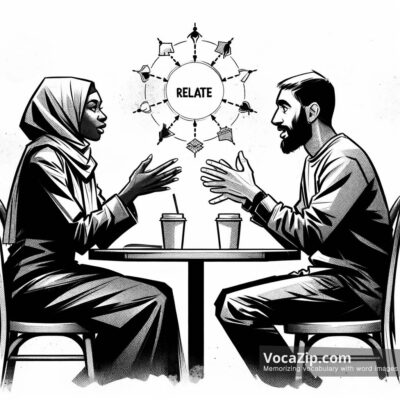relate meaning
relate :
to connect, to link
Verb
▪ She can relate the story to her own life.
▪ She can connect the story to her own life.
▪ The two events are related.
▪ The two events are connected.
paraphrasing
▪ associate – to connect in mind
▪ link – to join together
▪ connect – to join or link
▪ correlate – to show a relationship

Pronunciation
relate [rɪˈleɪt]
The stress is on 'late' and sounds like 'ri-late'.
Common phrases and grammar about relate
relate - Common meaning
Verb
to connect, to link
Part of Speech Changes for "relate"
▪ relation (noun) – connection or link
▪ related (adjective) – connected or linked
Common Expressions with "relate"
▪ relate to – to connect with something
▪ relate a story – to tell a story
▪ relate directly – to connect directly
▪ relate closely – to connect closely
Important examples of relate in TOEIC
Vocabulary examples from the TOEIC test
In TOEIC vocabulary questions, relate often means to show a connection between ideas or facts.
Example of a confusing word: relay (to pass on information)
Grammar examples from the TOEIC test
As a verb, relate often appears in questions about linking ideas or facts in TOEIC grammar questions.
relate
Idioms and fixed expressions in TOEIC
relate to
'connect with', used when discussing how things are linked.
relate a story
means 'to tell a story', used when sharing an experience or tale.
Differences between similar words and relate
relate
,
associate
differences
Relate means to connect things directly, while associate often implies a looser connection in mind.
Words with the same origin as relate
The origin of relate
Relate comes from the Latin 'relatus', which means 'to bring back' or 'to refer'.
Word structure
It has the prefix re (back), root lat (carry), and means 'to carry back'.
Words with the same origin
The root of relate is lat (carry). Words with the same root include translate (to carry across), legislate (to make laws), and elate (to carry out).
Please select an image in the quiz
Previous post and next post







